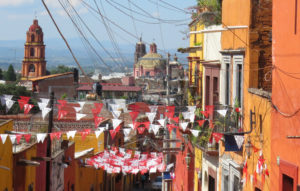
Why can’t expats and locals get along?
When we first moved to Spain we befriended a local taxi driver. He had been recommended to us by the owner of our Airbnb and we used him on our first commute to Nerja. I’ll call him “Luis”.
“Luis” was a nice guy. We practiced our Spanish on that first drive, although we both speak the language it had been a few years and we were a bit rusty (we would later find out he speaks perfect English. But we didn’t know that at the time).
A few months later we had to use him a lot. We were up to our necks in Spanish bureaucracy and had to make several trips to the foreigner’s office in Antequera (over an hour away). It was during the peak of Covid and unofficial travel between provinces wasn’t allowed. Taking the taxi was the easiest way.
We got to know him on those trips.
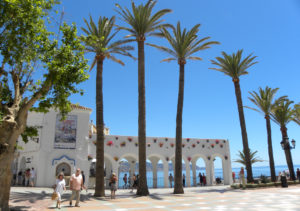
He would tell us about “the Expats”. The British/Irish who come to Spain’s Costa del Sol for cheap beer, sun and to hang around with their cliques of British/Irish friends. Besides getting drunk (their favorite activity), they have no interest in assimilating and rarely learn any Spanish. The Germans in Torrox (right next to Nerja) are no better. They have a tight community and many don’t speak Spanish OR English. He wasn’t crazy about people from the Nordic countries either, calling them cold and suspicious. You couldn’t help them with their bag, said Luis, they would suddenly tense up, thinking that he would either steal the bag or ask for an extravagant tip.
Despite his opinions, we had a lot in common with Luis and thought he would be our first friend/acquaintance in Nerja. After one of our trips to Antequera he gave us a large cannister of olive oil (from the Jaén region) and a large jug of homemade wine from Malaga.
But when the restrictions surrounding Covid ended, so did our relationship. We wrote him a few times for some short trips in the region. But we never heard back. At first we thought that he must be busy with the influx of tourists. Then we started to wonder if we had somehow offended him.
Eventually we came to the conclusion that maybe he just didn’t want to have Expat “friends”.
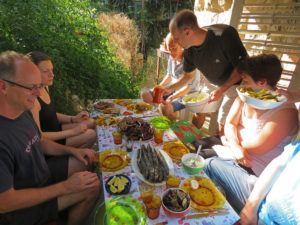
We had locals as friends and acquaintances when we lived in both Croatia and Thailand. In many places it’s quite easy to make local friends. Locals are usually curious about foreigners and are often very open to having foreign friends. In Croatia we were always invited over for dinner by locals we knew. I had a couple of Croatian friends that I would go hiking with. Even in Spain, spending several months in Seville and León, we became friends with locals. It was easy.
But we’ve realized that the more Expats there are in a place, the harder it is to make local friends. We see this here in Nerja. Yes, locals are friendly – but the more expats there are in a community, the greater the divide and stress between expats and locals. And sometimes you see little microaggressions pop up in daily interactions that make you realize that real feelings about foreigners are often hidden (oftentimes barely hidden) under the surface. Sometimes it’s when getting to know someone like “Luis” that you get to know what locals really think of foreigners (and most likely of you. Now I’m wondering what he’s saying about us…).
We’ve lived in Nerja almost 2 years now and it’s a foregone conclusion that we’ll never make local friends here. Sure, we have locals we talk to at the store. Nice, friendly people. But they’ll never be friends. The thing about places like Nerja is that the more expats there are, the more people tend to socialize within their cliques: the Irish with the Irish, the Scandinavians with the Scandinavians, the Spanish with the Spanish…
I reflected on the above after a few recent events involving San Miguel de Allende (Mexico), another place with a lot of Expats. I’ve previously described that town as “Mexico-lite”.
The first event was a comment I received a few weeks. But unlike most of the people giving me shit for calling SMA “Mexico-lite”, he came at me from a whole different angle:
We have lived in San Miguel de Allende for 17 yrs….in my experience after traveling all over Mexico (which you could do up to 6 or 7 yrs ago) it is one of the best places in the country ….and what made it that way were the gringos who protected it…..they were the ones that protested when a beautiful historic building was going to be torn down by some Mexican developer, when a Mac Donald’s tried to occupy a lovely old building in the Jardin, when a Mexican businessman from Mexico City wanted to open discos all over town, and the gringos won….never did I ever see a local Mexican in the protests…SMA would of become yet another trashy, dangerous hell hole without the foreigners that loved and appreciated it….not only did they save the historic centro but they create and finance a great library and backed numerous charities that feed and built houses for the poor in the countryside and set up schools for orphans and local kids who wanted to learn English to get better paying jobs ….plus their outcries were responsible for the Mexican government sending the national guard to keep the cartels at bay here which made it a very safe place to live in a country whose crime rate is soaring under the direction of a president who feels that criminals should be treated with kid gloves.
Yikes. So is that what Expats in Mexico think of the Mexicans? There’s some truth to parts of the above. Americans do deserve credit for saving San Miguel de Allende. But did they do it for Mexicans or for themselves? And it wouldn’t have happened without the Mexican government allowing it to happen.
But my take on the comment is that it is condescending and reeks of colonialism. If someone thinks so lowly of Mexico and Mexicans maybe they should go back to where they come from. And if you’re Mexican and you meet someone with an attitude like the above, how are you going to feel about foreigners in general?
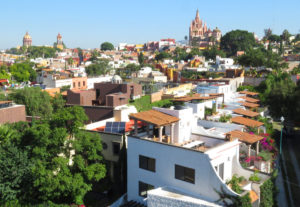
The 2nd event had to do with a volunteer group my mother was a part of in San Miguel de Allende. They administered a non-profit clothing center in SMA that helped fund an old age home. Once a week my mom would go there and organize, price, and tend the register for the charity. All the volunteers were Expats. What could be wrong with that, right? They’re just helping out the local community.
Well, last week the Board of the non-profit decided to terminate the relationship with the Expat group. From now on, all volunteers will be Mexican. It left the Expats in disbelief and a bit of anger.
The gang of Expat old ladies are now looking for a new cause they can contribute to.
Why would the Board of a non-profit do something like that? I don’t know. I don’t have feet on the ground in San Miguel de Allende. I don’t know if there are local tensions…But I find it a shame. Why couldn’t the Board maybe include volunteers who are both expat and locals? Why is it always “we” or “them”?
So why can’t expats and locals get along?
In actual fact they often do, case in point our experiences in Croatia. In many places Expats leave a small footprint and assimilate into the local community.
In my opinion, the problem happens when a place attracts too many Expats. They come in with their money and change a place, often leaving locals priced-out and feeling like 2nd class citizens in their own city/country. The thing is, I think many (most?) expats come in with good intentions and a willingness to integrate and help the local community.
But, in the end, maybe good intentions don’t matter if we’re just making the locals resent us by just being there?
What do you think?
Related: On Travel to Mexico – why I’m sick of the ignorance
Related: The life of a hotel owner in Patzcuaro (Mexico)
Related: Why I’m sick of the “Expat” VS “Immigrant” argument


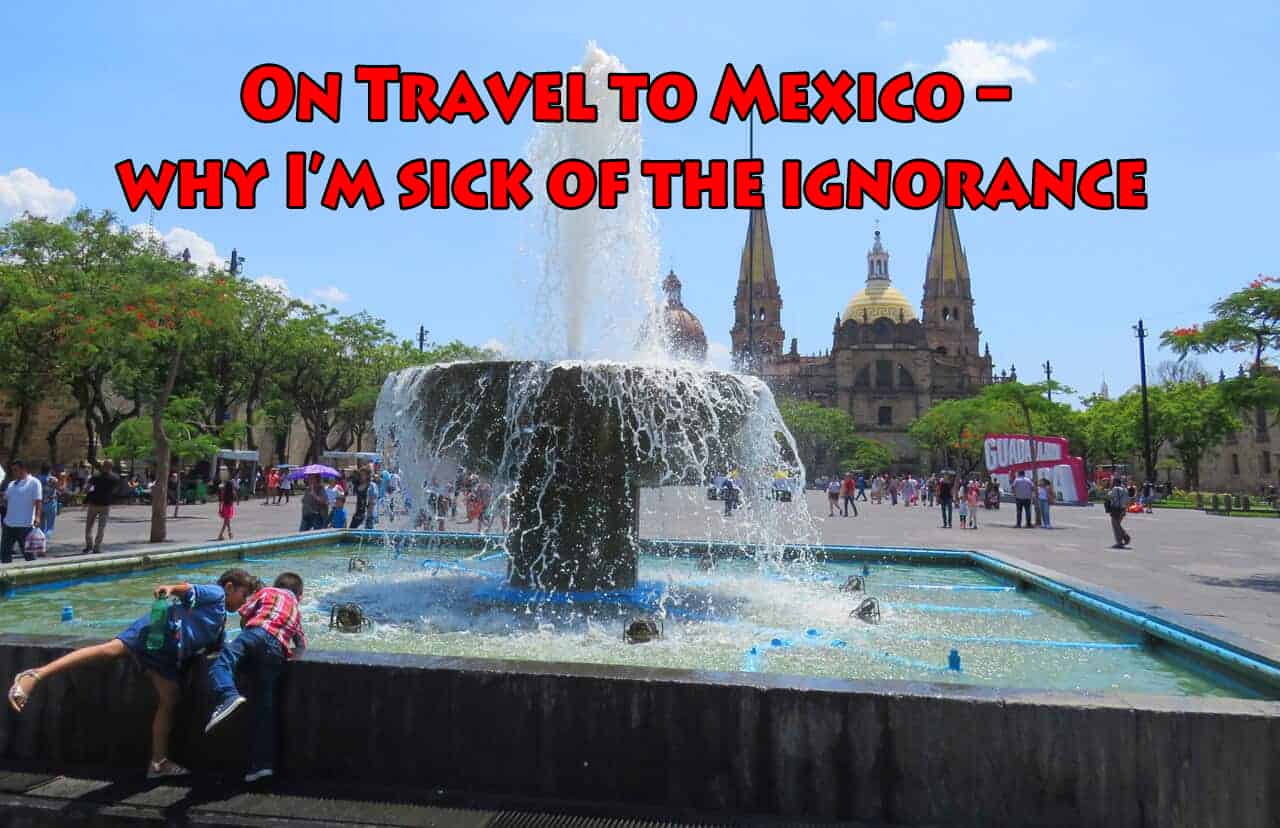
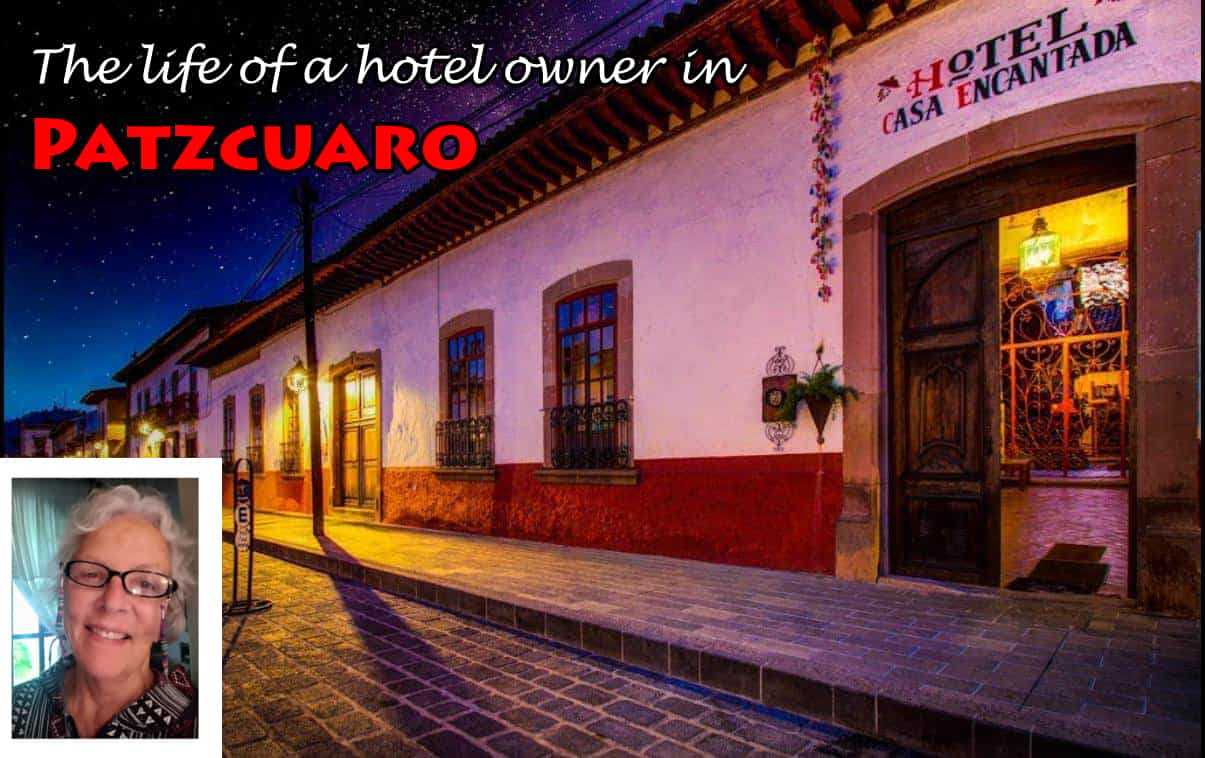
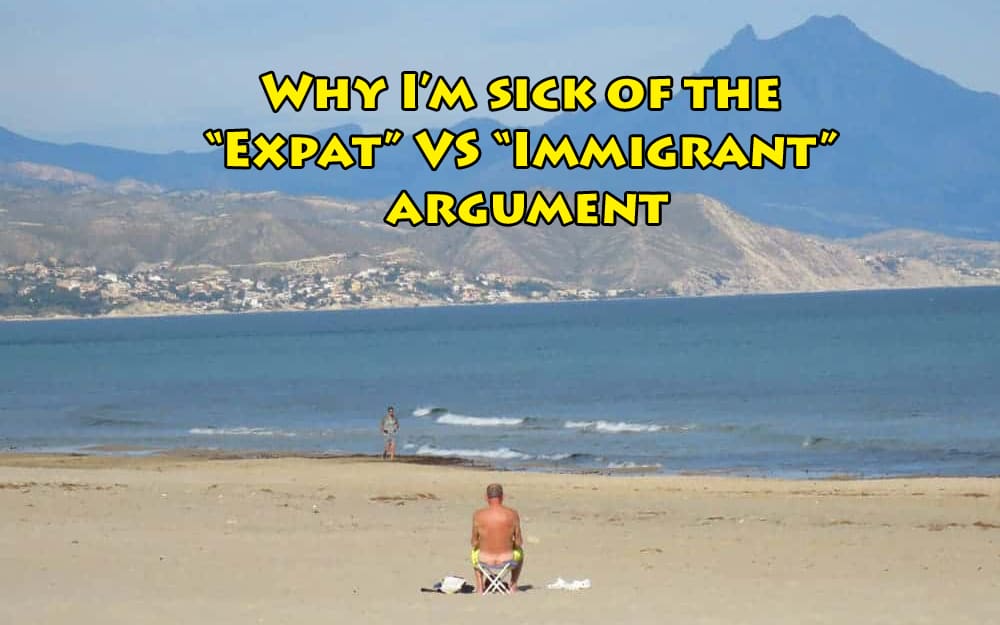
I don’t want to sound rude or make anyone sad, but I’ll try to explain something to you like a local.
Besides the fact that locals may have little free time – work – family – old friends and don’t have space and time for new friends, the problem may be elsewhere.
Tell me the advantages of having expat friends. I can’t think of any. I had 3 expat friends. 2 from Europe, 1 from Asia. Disadvantages: I often translated official documents for them or helped with doctor’s appointments because they didn’t want to pay for a translator. They often asked me to cook local food. When I asked them to cook food from their national cuisine, they said they couldn’t cook/the ingredients weren’t available in this country. After moving, there was a contact on FB, which gradually disappeared. They said they were too busy in the new country/they didn’t respond to messages much.
I talked to other locals about it and they had similar experiences and felt used as free translators. They also told me that none of their expat friends had ever invited them on a vacation to their new country, or their country of origin.
According to them, expats are also looking for adventure and new experiences in a new country and in return they bring nothing to their local friends.
I mean, there is no reason to be sad if you only have friends among expats.
Locals also often expect long-term and stability from friendships, which an expat cannot offer.
Thank you Katarina. You make valid points, all of which I agree with. There’s also the flip side of that: sometimes Expats feel like locals will take advantage of them or expect them to pay for everything, all of which makes them distrustful. Either way it is a complicated relationship.
As a Mexican-born citizen, what troubles me the most is when individuals move to Mexico or another country because of their affection for it, but later desire the new location to resemble the one they left behind. Mexico, like any place, has its positive and negative aspects, but I believe it’s essential not to attempt to alter them if you are not a native.
Ive lived in Cabo for a dozen years, then Guadalajara for five, now Colima for nearly four. I have found that there is always some tension between locals and expats due to perceived and real cultural differences, but they are simple to bridge if you aren’t an ass hat. Simply put, check your entitlement and expectations of efficiency as it might be at home. That type a attitude is the greatest roadblock other than language. Obviously put in the effort to speak conversationally or better – nobody wants to be around people with whom communication is a struggle. But mainly, recognize friendship often involves shared interests and values, which are often not possible with diverse cultures. Think of it as simply as you love going to the club every weekend and they like hanging at home with family. Regardless of how much you want to be friends you are probably not going to have much in common. That is life. I have some close Mexican and Argentine friends, and a few expat friends, but we all share common interests and perspectives. That is also true of my gringo friends back in the old country. Simply put, locals aren’t looking for new friends with the same motivation as new arrivals who are attempting to create a new social network. They have longstanding relationships already, and are probably fine with that. So there isn’t much in it for them to put in the effort to create new ones, especially with folks who look and speak differently. Human nature. Pretty sure none of my American friends have embraced recent Somali or Lebanese immigrants to the US for much the same reason.
Will I be perhaps one of the few Mexicans to comment? 😉. Definitely language is a barrier and -at the same time- first form to show your interest for the “other’s” culture. The same happens to Mexicans who go abroad and don’t try to learn the local language.
I would say that after that, when you are a migrant, you try to learn as much as you can from the locals, share ideas, a table, and understand the place… Even if you don’t need to. And well, it takes a lot of patience, involvement, and it goes both sides.
It would be nice to continue this conversation… The subject is wide and challenging.
Always happy to have Mexicans commenting 🙂
I think the most important thing foreigners can do when moving somewhere is to learn the local language and try to integrate into the local community. After all, we expect the same when immigrants come to our country. Why is it different if we go to theirs?
As you say, it’s not always easy. But the biggest thing anybody can do is try. Locals will always appreciate it.
I’ll give you an interesting example to help cement your hypothesis.
We have been in Mexico for 17 years. I am fluent in Spanish and my wife is 50% despite her best efforts at becoming fluent. We live in a “snowbird” touristy place. 6-8 months of the year, there are very few gringos in our area. 4-6 months of the year there are very many.
We feel treated differently depending on what time of year it is. In the summer, in 42C weather when we are out and about, we seem to be treated the same as I can observe anyone else being treated. in the cooler months when its 25C outside and we are one out of thousands of other “gringos”, the people seem shorter with us, they communicate in signals (or in broken english) and they often ignore us. It’s a different feel. In the warm season we are treated as well as anyone else. In the snowbird season we are treated like only semi- welcome invaders.
I grew up in a summer tourist town up north and we had a very similar love-hate relationship with city people. You knew that your lifestyle was positively affected by the influx of millions of tourist dollars in season, but you had to deal with entitled, rude, drunk, oblivious and sometimes dangerous people to get the benefits. Love-hate. It seems very similar here.
I’ve been to some heavily gringo influenced places nearby us and have seen how the influx of millions of tourist dollars has helped the local economy out a lot. Overall this small community has a very high average standard of living. The city I live in has a markedly reduced amount of very impoverished people compared to other cities i have visited and worked in. Partially because of the tourist industry and ex-pat community. The influx of money from outside of the community is rarely unfelt by the locals. It is usually an overall benefit.
Becoming friends is something else entirely. It is very individualistic and usually depends on having a strategic, influential contact. If you can get “in” with a local person- they can introduce you to their social circle and you have street cred in that circle. If you cannot (sometimes thorough no fault of your own, you simply cannot for reasons listed above and in various other comments) then you will remain surfacey. It’s a sad thing, but it is hardly endemic to a cross cultural situation. I have seen that happen with people changing cities within the same cultural context. You need to find people in the friend market with whom you mesh. And in some places, that market is very small.
It is not unusual in any context where there are large numbers of immigrants from similar cultures for the first generation of immigrants to be mostly together. It is the same with Asians or middle easterners living in North America now, or eastern or southern Europeans did 50-100 years ago. By the second and third generations, they see themselves more as part of the new culture than the old. They are mostly assimilated. In the context you speak of- most of the North Americans aren’t having or raising kids in their adopted country. They are not immigrants. They are ex-pats. Out of their passport country for a time, but with the anticipation of returning “home” some day. Very similar to the filipinos in the middle east.
Thank you very much for this excellent comment. Couldn’t agree with you more!
It is for exactly the main reasons being expressed in this chat ‘why’ my partner and I are moving to Queretaro City from the Lakeside Chapala area in Mexico where things are completely out of whack and, in my opinion… unhealthy. It’s weird because my parents lived here some 20 years ago and -wow- a lot has changed, namely… expats, immigrants, gringos… whatever term you use have absolutely taken over this beautiful location. There is a fine line between being ‘helpful’ and ‘condescending’ and once-upon-a-time, not so long ago, the scales were tipped in favor of the ‘good’. Not any more. The huge numbers of – mostly U.S. and Canadian citizens coming here for a cheaper but better quality of Life with no interest in integrating is stunning! And, not in a good way which is sad because the people who are here and work hard, every day, to help fill in some of the social gaps – get lost in the loud crowds. I have seen, and others have told me, of instances where locals have driven through the pueblos yelling for yankees and gringos to go back where they came from – time to go! Prices have sky-rocketed (especially rents and house sales) and that is not just on the foreigners, certain Mexicans are taking full advantage of the current bull-market. I’ve been taking classes in spanish for about 18 months now, my partner for 3 years and we get by but can’t seem to get any further forward. We have mexican friends/neighbors who have invited us to their homes for dinner, buen noche – because we are one of very few in the neighborhood who attempt to speak spanish. But, the truth is, you don’t have to speak spanish to live in this area – at all. We think Queretaro – where we can be more ‘anonymous’ and are completely out-numbered – is the place to speed up our spanish and integration into a country where we don’t want to be the center of attention or resentment. Thanks for the honest article – needed to be said.
Thank you Kim. You get it. I’ve gotten a lot of comments on this post along the lines of “we get along just fine with locals”. Yes, but do you live in SMA, Ajijic or Puerto Vallarta? And it’s not so much aimed at the personal level but at the macrolevel: some people might have good personal relationships with locals in their neighbourhood but how are foreigners in general perceived in the community? Your comment is exactly what I’m talking about.
Thank you for taking the time to share!
I first went to Mexico to learn Spanish. I did that and became fully fluent and I lived there long enough to completely assimilate and even became a citizen. Now when I look back at the pictures I took when I was there three years ago 3/4 of the people in my photos are Mexican and that’s totally representative. And guess who I miss the most know that I’m not there? My point is if you don’t speak the language fluently you will never be considered as one of them.
Fascinating topic!
When we first moved to Tenerife I was SO curious about this question of integration. A good friend who had gotten his PhD in the USA (and been “adopted” by an American family during the 5 years he lived in the States) gave me some insight. In general, the Spanish have large families that live close by. Their social life is mostly taken up with family gatherings (this friend was the youngest of 6 and his wife had 3 siblings — between the two of them, their weekends were booked solid with family events, birthdays, etc.) He said to me once, “between childhood friends that he’d grown up with and all of the extended family on both sides, I don’t ever feel the need to reach out and make new friends”.
The next issue (which I believe makes locals reluctant to reach out) is transience. When we moved to St. Andrews, Scotland, one of the first questions we were asked was, “How long are you here for?” It’s a university town so this seemed normal, but we learned that some folks don’t want to make the emotional commitment unless you are going to be around for more than a year or two (we were there for six great years – and felt fully integrated by the end!)
Thoughts?
That makes sense Sarah. But I think some people are always curious about other cultures and open. As I say, we made good friends in Croatia and I think they generally have the same family dynamic. But we had an “in” – we had an Airbnb owner that we got along well with and it kind of grew from there. Pretty soon I was hiking regularly with him and his best friend, I actually opened that up to them because they weren’t hikers.
But again, he didn’t have a hundred foreigner would-be friends…Expats in Split were few at the time.
We’ve also made friends in Spain but again it was through Airbnb hosts or people we met at the gym and they weren’t where there are lots of tourists or expats.
But your 2nd point is bang on as well and even we’ve been cautious with that.
Another point is that friends are always harder to come by when you’re older. Most friends anybody makes are though childhood friends, school etc…the older you get the more they and up as acquaintances rather than friends. And I think that also ties in with both factors you’ve mentioned above.
Thoughtful comment!
Very interesting article. I am very familiar with the expat places in the coasta del sol, My family and I have been going there for years. I have about a c1 level of Spanish but my parents only know a few words but at least they try and make the effort. I have a friend that lives in Torre Del Mar and he told me that many expats there don’t even have a basic level of Spanish. I have experienced more or less the same thing in the rest of the coasta del sol and I’ve been going for the last 5, 6 years or so. I think language barior is a major problem for many expats, especially the andaluz dialect. I think we also have to remember that many people from the UK and Ireland especially are not use to learning languages to a very high level. In general the teaching of foreign languages is god awful in schools. Some people are just not good at languages. I have been to many parts of Spain but if I were to move there I’m not really sure if I’d choose the Coasta Del Sol. I’m originally from Ireland and I forgot to say i am blind. I have also traveled to many countries with my family, i’m really glad I had those opportunities because I feel the society here is not very welcoming at all towards the disabled and i’ve lived here all my life. It’s been really hard to meet new people here. I have a law degree and a masters but i didn’t feel welcome in neither secondary school nor university. so i’m really glad I had all those opportunities to travel with my family.
P.s. i’m also very familiar with Nerja and how the various expat groups tend to stick together.
Interesting article. I think the dogged insistence on using the term “expat” instead of the more accurate term “immigrant” doesn’t help. That’s something, to me, that reeks of colonisation. It’s used to denote some kind of cultural superiority to the local culture. But, it’s true, the more individuals of a new cultural group there are in a location, the more difficult it becomes. We see that in our home countries and we congregate here in our commonalities. It’s human nature.
I’m actually so tired of that Expat VS Immigrant conversation. I wrote about the difference here: https://bbqboy.net/living-in-spain-are-we-expats-or-immigrants/ Really, it depends on where you are in the process and mentally, your goals etc. Expat is a simple term to use and not as cumbersome as “Immigrant” which has it’s own connotations. Besides which, every “Expat” FB group would have to change their names. “Immigrants in Mexico”? Just doesn’t sound right. I wish there was a term that was neither…
Nope, the two terms mean completely different things and has zero to do with goals. How is it cumbersome? More letters? A longer word? It’s literally the truth of our situation. Doesn’t sound right? Too bad. We call ourselves expats when we move to another country but call those from other countries, who move to our home country, immigrants. Thats a colonist view right there. Visas such as the Non Lucrative Visa and even the Gold Visa (if one resides in Spain etc) are for residency which is an of immigration. I’m a visa holder living in Spain, that makes me an immigrant. It’s not complicated. Oh, and I’m working too. Still an immigrant.
Yes, well what if I got the NLV because I just wanted to stay past 3 months? Say a year? Then for me Spain is a bump in the road, not a place I intend to spend the rest of my life. I’ve lived in many other places than Spain in my life.
So we don’t have to look at it the same way…but don’t speak for me or others, people have different intentions.
I’m honestly bored of the whole subject and couldn’t care less.
Immigrants come to stay, expats come for a while and leave. It’s really quite simple the difference. No need to politicize it.
The idea that immigrant is more accurate and expat is cultural superiority, has been debunked.
See Qroo Paul’s explanation.
Not only is expat accurate by the dictionary, but shows how the ‘woke’ expats or White Saviors are the problem.
Yes there are problems fitting in depending on where you live and many more reasons, but to say immigrant is more correct is just ‘wokeness’ going rampant even here.
El problema es siempre el aire de superioridad, que apesta…..
Gracias Alf. Creo que la mayoría de la gente no piensa así. Pero es como cualquier otra cosa: unas pocas personas lo arruinan para todos los demás.
I have lived in several countries, and I think you can’t underestimate the language barrier when it comes to making friends. To be able to really relax around other people, you have to be able to communicate both effectively and without a huge effort. To even understand humor is a pretty high bar! As English speakers we are very lucky that so many other people want to speak our language–that is a great help on a logistical level when we are in other countries, but it can also interfere with really getting comfortable in the local language. I think it can be even more difficult now that we can use the internet or google translate for everything. When I fetched up in Bolivia in 1989, you can bet I picked up Spanish quick, because I had zero other options! I became reasonable fluent in a year. By contrast, I was able to get by pretty well in Poland over 25 years later with a smart phone and very little Polish. (I had no intention of staying there permanently, so that was fine.)
IMO, it’s a “gringo thing” to expect the locals to accept them just because THEY (the expats) feel warm and friendly, therefore the locals should feel the same. Well, they don’t. It’s a significant cultural gap between the highly developed Western countries, where attitudes and perspectives have been shaped accordingly, and people who live in less-developed, economically slower countries. Many expats arrive with good intentions and big hearts and EXPECT to be welcomed and appreciated. Too bad. Different culture, different perspective. I could go on about this but it comes down to an unintentional arrogance vs. national/cultural pride. This is only my opinion though not without experience.
Very good comment.
I guess it’s how we feel about anyone coming to our country, be they tourists, immigrants or expats: it’s fine when in smaller numbers, it’s not fine anymore when there’s too many of them and they take over.
Interesting post! I’ve seen the same—too many ex-pats and then, it’s more polarized.
Too much income disparity, a sensibility in which locals are seen as potential ‘servants’, locals getting priced out of real estate and that not learning the language thing…it all can exacerbate this, too. Saw outright hatred somewhere in Costa Rica for some of these reasons, esp the real estate prices.
Anyway, great post. I never comment on blogs and here I am. Before having morning coffee. 🙂 Bien hecho!
Hi Lisa! I remember you – I would read your blog before I even really knew what a blog was. That was almost 10 years ago now. I hope you are doing well.
This is one of those posts that seems to be confusing people. Maybe they don’t get where I’m coming from. But when you’ve seen some of the Expat-heavy places (and I’ve seen a lot recently) it just jumps out at you that the expat-locals relationship is different than in places where there are fewer expats. You’re right, Costa Rica perfect example. We didn’t like CR at all, there was absolutely no love from the locals who are aloof at best. And I can’t blame them as I wrote about here.
I love it when people leave comments telling me they agree with me 🙂
Hey Frank, wow this topic has so many layers and factors to consider that i doubt anyone can find a satisfactory answer. I’m sure most expats wrestle with the notion of how far to integrate into their new foreign home. Some take it up as a constant (and fun?) challenge to see how far they can go to be recognized as a “local”. While others don’t put any effort into it at all, not even learning some of the basics of the local language.
I think you have to look at this in terms of a spectrum or sliding scale where every expat has to come to some decision about how far they want to integrate based on their personal desires, interests, abilities and comfort zone.
At one end of the scale you have those Brits that you’re talking about in southern spain. While at the other end you have the very rare expat/immigrant that has fully integrated into their new local community. And of course there are thousands of possible situations in between.
Andrii’s analysis above is spot on. And i think full integration is very difficult to accomplish. Even when i see all the immigrants here in Toronto wearing their Blue Jays gear, speaking broken English, eating a hamburger, big smile on their faces….. they may have lived here 2, 5 or even 10 years, might even have their canadian citizenship but they probably still feel like they’re “outsiders” and are probably still viewed by others as an outsider.
I was a bit thrown off by the title of your piece: “Why can’t expats and locals get along”. It seems to suggest that there is an almost constant tension or conflict between expats and locals. I dont think that’s really true and you probably didn’t mean it that way. I’m sure there’s some conflict on the rare occasion but for the most part expats and locals get along well…… afterall, think about the thousands of expats/immigrants that live within European countries, Mexico or N. America. For the most part everyone gets along fine.
It’s often right wing politicians with an agenda against “outsiders” who try to provoke others that leads to conflicts such as recently with the Florida governor flying a plane load of Latino immigrants up to Marthas Vinyard to score political points!
You also mentioned that there might be resentment among locals when all the expats buy up and restore properties driving up local rental prices. This reminded me of the same argument used by the anti-Airbnb crowd, except in this situation it was the locals themselves that were buying/renovating properties to put up on airbnb……. Conclusion? Locals are always pissed off about something! BTW, in my town in S. France and many other small towns in the south, it’s mostly the wealthy French from Paris and Lyon that are buying up run down stone houses (les maisons secondaires) to restore, driving up local prices, etc. Are these out of town French to be considered as “expats”?
Anyways, super interesting topic!
Saludos!
Hey Don! Hope you’re well. In Colombia yet?
What you say about a sliding scale is exactly right. We’ve posted it in different places on FB and have gotten everything from “What are you talking about?” from Expats to Mexico City to people in SMA loving the post and agreeing with all my observations.
The post was more about pointing at the places where there are too many expats and highlighting the problems there. Places like the Costa del Sol, SMA and Puerta Vallarta and parts of the Yucatan. You’re right it’s not a concern in most cities that are NOT retirement hotspots. But I guess between living here most of the year and then visiting my mom in SMA for a month of the year I just see a lot of the same. Maybe it’s time to leave the Costa del Sol!
I agree with all your points.
Maybe the title was off – but there’s only so many characters you can fit into a title on WordPress 🙂
As far as wealthy investors or opportunist locals looking to make a buck: Greed will always prevail if government officials don’t regulate. I think of central Lisbon which has become an Airbnb-ghetto. But that’s another post…
Always appreciate your comments Don!
I wrote a long well thought out comment and I don’t see it here.
When did you write the comment Kathleen? I just looked to check if it was in spam and there’s nothing there.
If we separate…we will always be divided. Should be a priority to learn Spanish,to build relationships with locals and immigrants ( expats). I know Americans living in sma for more than a decade and never learned Spanish or have any contact with locals….what is the point of living in another country. I know I can’t generalized but is pretty aparent the division. Let’s melt and understand we are one. And just treat people as you want to be treated.
Rita: I think that some people do not want and do not need to integrate into a new country. Someone comes because the new place has sun, warmth and sea for 4 months suitable for swimming and cheap accommodation. His job may be far away in a richer country and his wife and children are enough for him to live. That is why some people do not learn the language of the new country. And that is why some people (especially native English speakers) get upset that an official or doctor in a new country does not speak their language.
Some people don’t want a new culture, they just want a higher standard of living. There are people who want adventure.
Great article. Back in 90’s while going to college in DC we did a local TV show Racism on College Campuses and the theme was exactly that. One of the anecdotes was my experience during our school meals; I always sat by myself. I wasn’t welcomed with Asian, Arabians or even plain white Americans. Unfortunately our societies look something familiar and that’s exactly what’s going on SMA, Los Cabos, PV and now pretty much in Mexico City.
I can somewhat echo what Andrii says. I once moved to rural West Virginia. My nearest neighbor was about 2 miles away. Everyone, when mentioning her, always said “She is from Ohio”. I discovered she had left Ohio to move to our little “holler” 35 years before! In spite of having the English language in common I never would have fit in because our cultures were so different. So, like your case, I found acquaintances, but would have never found friends.
I come over to the UK in my early twenties and although I met and befriended Brazilians, it was always a priority for me to meet British people and integrate. I made British friends through my work.
Language can be a big barrier, often people move abroad thinking they will learn the local language, but they struggle. Particularly older people.
To have common interests can help with making new friends, such as with your Croatian friends you enjoyed the hiking. Do you guys have any hobbies there that would lead to meeting locals?
I remember enrolling in a sewing class once upon a time in order to meet people in the local area, I soon realised I hated sewing but I met some lovely ladies.
I totally agree that the high number of expats in the South of Spain makes it harder to integrate with the Spanish people.
Interesting post 😀
You are exactly right Gilda, common interests help. But in the case of where we are here for example: I couldn’t find a “Spanish” hiking group, even after asking a few locals including “Luis”. But I easily found an Expat hiking group full of, of course, expats…There’s a whole bunch of other groups but as far as I know, they are all organized by expats (I guess we expats all have more time on our hands for different activities).
And that’s what I’m saying about places with TOO many expats. It would probably be different if we were in a place like Valencia or Madrid…
But there are many things we could do if we really wanted to “hunt” down local friends. We could do intercambio, a language exchange with with locals. But I can’t think of anything else right now.
I’ve lived in different parts of Ukraine, and can say that moving even 200-300 km within the same country where people talk the same language makes you an “expat”, at least for some time
There are cultural differences, different takes on history events, some love and/or hate nurtured from the day child was born, and you don’t know all of that. And what is even more important, you don’t feel it
I came to an understanding, that to become “local” – you have to accept everything, learn what and how locals learned. Basically, you have to dissolve in local traditions, views and manners, at least for some time, so all of that become “native” or “usual” to you
And that’s what most of people don’t want – I don’t want to dissolve, I don’t want to overwrite my mind, I don’t want to loose my personality, amend my views, change the way I talk (even though the language stays the same). I want to be free.
As a result, if you are lucky, you’ll find “locals” or “expats” with same respect of freedom, and you’ll have friends.
Thank you Andrii. Interesting that you feel that even in different parts of Ukraine where you don’t have the same cultural and language differences that most “expats” encounter. I understand what you are saying.